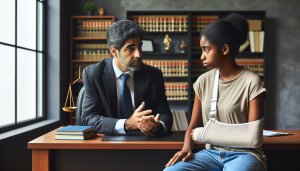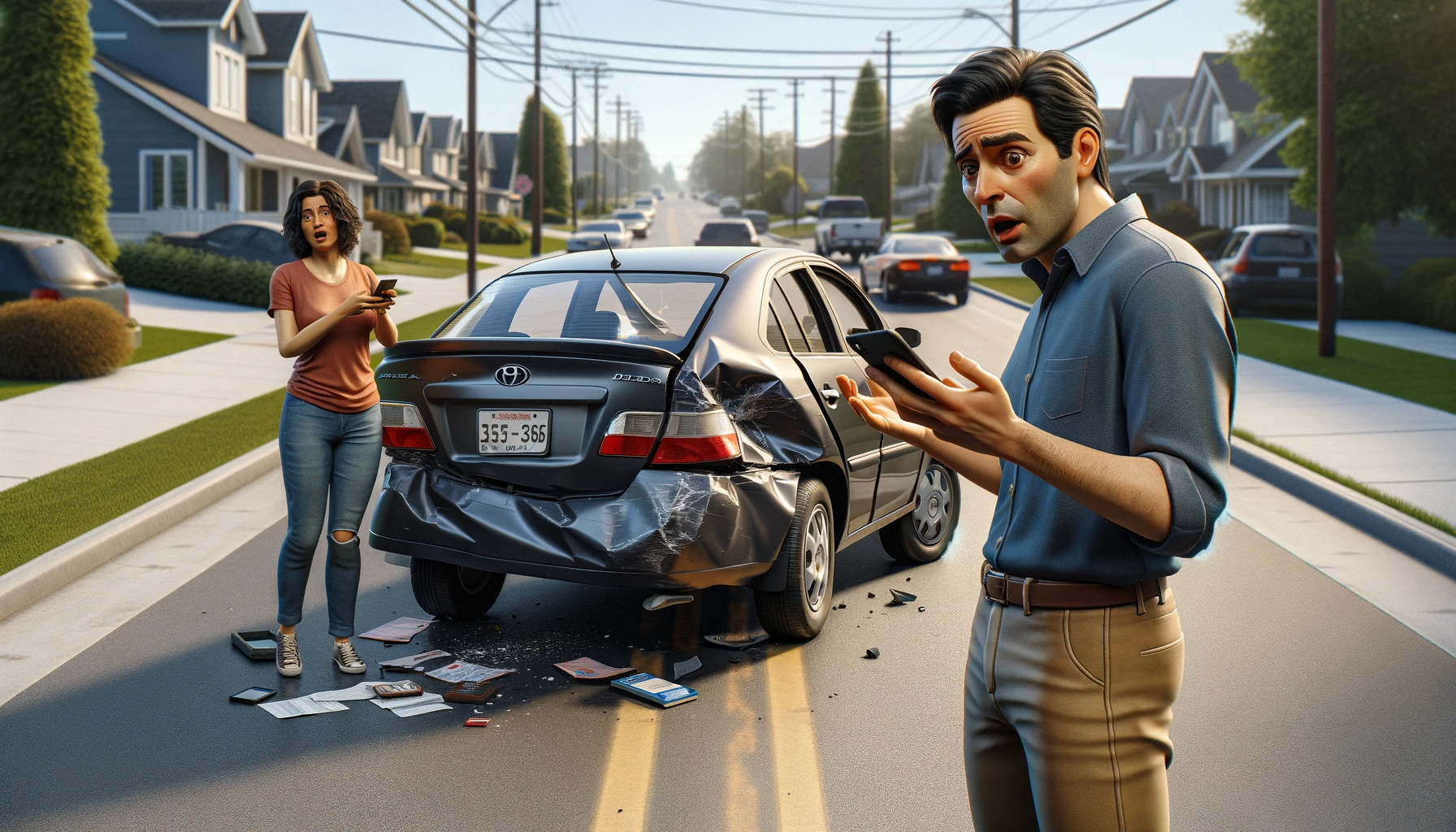Personal injury claims are a legal avenue that individuals can pursue if they have suffered harm as a result of another person's negligence or intentional conduct. The parties involved in such cases are usually the injured party, referred to as the plaintiff, and the person or entity allegedly responsible for the injury, known as the defendant. In this introduction, we will cover the basics of personal injury claims, the nature of liability, and what steps to take if the person who caused your injury is unwilling to pay.
Personal injury claims arise when one individual suffers harm from an accident or injury, and someone else might be legally responsible for that harm. This typically involves situations where the defendant was negligent, meaning they failed to act with reasonable care, leading to the plaintiff's injury. But it's not restricted to negligence; a claim could also be filed for intentional wrongs.
Types of Personal Injuries
The scope of
Personal injury claims can be broad, encompassing a wide array of scenarios. Some of the most common types include motor vehicle
Accidents,
Slip and fall accidents, medical malpractice,
Dog bites, and product liability cases. Regardless of the type of injury, however, the plaintiff must establish that the defendant's action or inaction was the proximate cause of their injuries.
Understanding Liability in Personal Injury Claims
Determining liability in personal injury cases usually hinges on the element of negligence. When a defendant fails to act as a reasonably prudent person would under the same or similar circumstances, and this breach of duty causes injury to the plaintiff, the defendant can be held responsible. It's important to note, though, that the defendant's liability isn't automatic. Rather, the plaintiff has the burden of proving the defendant's negligence.
When the Defendant Refuses to Pay
When the person who caused your injury is unwilling to pay, it may be necessary to escalate the matter legally. Typically, this means filing a lawsuit in court to compel payment. This process can be complex, requiring careful adherence to procedural rules and compelling presentation of evidence. It's often recommended to seek legal advice to navigate through this process.
This introduction provides a basic understanding of personal liability claims. The subsequent sections will delve deeper into what you can do if you're faced with a situation where the person who caused your injury does not want to pay.
Understanding Legal Obligations After an Accident
Recognize Your Legal Duties Post-Accident
In the event of an accident, your first legal obligation is to stop and assess the situation. This involves verifying if anyone is hurt, and calling emergency services if required. It's essential not to flee the scene as it can lead to serious legal penalties.

Reporting the Accident
Most jurisdictions have specific laws about when and how accidents should be reported. It often depends on the severity of the damage or if someone is injured. You're typically required to report the accident to the police or a designated government agency.
Exchanging Information with Other Parties
Another obligation post-accident is to exchange relevant information with other parties involved. This includes full names, contact information, insurance details, and driver's license numbers. This information is crucial for insurance claims and potential lawsuits.
Communicating with Insurance Companies
After an accident, you must notify your insurance company promptly, even if the other party doesn't want to pay. Your insurer may require a detailed account of the crash, including photographic evidence and witness accounts, where available. Be honest and accurate; misleading or false information could result in denial of coverage.
Navigating Liability and Negligence Laws
Depending on the jurisdiction, varying laws apply to determine who is at fault in an
Accident. In some areas, a shared fault rule may apply, which affects the amount of damages you can recover. Understanding these laws can help ensure you are not unfairly blamed, particularly when the other party resists paying.
Guiding Steps When the Offender Refuses to pay
1. Document All Related Incidents
The first step if the person responsible for the accident refuses to pay is to document all related incidents meticulously. Include details of the accident, any conversations that occurred afterward, attempts to collect payment, and their refusal. This can include photos, videos, emails, text messages, or other relevant proof. All these pieces of evidence may be critical to build a strong case.
2. Contact Your Insurance Company
It's important to notify your insurance company about the situation. Provide them with all relevant details about the accident including specifics regarding the offender's refusal to pay. They can guide you through the process and give advice based on your policy details. Furthermore, they may also contact the offender's insurance company, adding further pressure for them to pay.
3. Consult with a Legal Professional
Engaging a legal professional can be advantageous if the offender continues to refuse payment for damages caused by the
Accident. A skilled lawyer can provide valuable legal advice, protect your rights, and guide you in pursuing compensation effectively. They can help you understand your options and take appropriate legal action, which could include filing a lawsuit.
4. File a Lawsuit
If all else fails, your final recourse might be to file a lawsuit against the offender. This should be your last resort, as it can be both costly and time-consuming. However, if the amount you're trying to claim is significant, and there's clear evidence that the offender was at fault, then a lawsuit could be worth considering. Consult with your lawyer to make an informed decision.
Legal Options Available for the Victim
Initiating a Civil Lawsuit
If the person who hit you refuses to pay, one of your legal options is to initiate a civil lawsuit. In this course of action, you would typically sue for damages, which can include medical costs, property damage, lost wages, and even emotional distress. It's worth noting that lawsuits can be timely and costly, so it's important to consult with a
Personal injury lawyer to determine if this option is worth pursuing.
Pursuing an Insurance Claim
In most cases, the insurance company of the person at fault should cover the damages from the accident. However, if the person doesn't have insurance, or if their insurance doesn't cover enough of the damages, you might need to make a claim with your own insurance company under uninsured or underinsured motorist coverage. Remember, it's important to keep all documentation related to the incident and your damages.
Negotiation and Settlement
Another option is to negotiate with the person who hit you or their insurance company. This could lead to a settlement where both parties agree on an amount of money that will be paid to compensate for the damages caused by the
Accident. Settlements often involve compromise but can expedite the resolution process and save both parties from lengthy litigation.
Small Claims Court
If the value of the damages is relatively small, you may consider taking the matter to small claims court. Small claims courts are designed to resolve minor disputes quickly and without the need for expensive legal representation. The maximum amount that can be claimed varies by jurisdiction, so check your local limitations.
Seeking Legal advice
Finally, always seek legal advice from a qualified attorney. A professional can help you understand the laws in your state, guide you through the legal process, and represent you in negotiations or court proceedings. They can provide detailed advice based on your specific circumstances, which is invaluable when dealing with legal matters.
Potential Role of Insurance Companies
Handling Initial Contact with Insurance
One of the primary roles of insurance companies in an
Accident scenario is to evaluate the claim. It usually begins when the at-fault party files a claim with their insurer, notifying them about the accident. However, if the person who caused the accident is reluctant to assume responsibility, you can reach out to their insurance company and report the accident yourself. Remember to provide as much information as possible including photographs, witnesses, and police reports to support your claim.
Investigating the Accident
Upon receiving a claim, the insurance company will initiate an investigation to ascertain the validity of the said claim and determine liability. This process involves studying the available evidence, talking to witnesses, reviewing police reports, and even visiting the accident scene if required. The key here is to cooperate fully with the investigators by providing all necessary documentation and information to facilitate a smooth process.
Settlement Negotiation
Once the investigation is completed and one party is found to be at fault, the insurance company then moves to negotiate the settlement amount. This step is crucial as it determines how much compensation you'll receive for damages. Often, insurance adjusters might propose a lower settlement than what you might expect. Therefore, understanding your rights and having an idea of the value of your claim can help during negotiations. If the negotiations are not fruitful, the matter may proceed to trial.
Payment of Claims
Assuming that the at-fault party's insurance company agrees to pay, they would typically cover the cost of damages up to the limit of the policy. These costs can include repairs or replacement of your damaged vehicle, medical expenses, lost wages due to inability to work, and other associated costs. If the policy limit is exhausted and you still have unpaid damages, you might need to pursue personal assets of the at-fault party.
Legal Representation
In situations where the person at fault refuses to accept liability or their insurance company denies the claim, the insurance company also plays the crucial role of providing legal representation to the insured. This is typically covered under the liability portion of their policy. As a victim, you may need to employ your own
Personal injury lawyer to pursue a civil lawsuit in this instance.
Impact on Your Financial and Health Status
Financial Consequences of Unpaid Damages
When the person responsible for causing an accident refuses to pay, it can lead to substantial financial strain on the victim. The economic implications are often two-fold: direct costs related to the accident such as medical treatment, repair of damaged property, or lost wages; and indirect costs like increased insurance premiums or loan interest rates resulting from worsened credit scores due to unpaid bills.
Coping with Medical Expenses
Medical expenses make up a significant part of direct costs following an accident. These may range from immediate medical care to ongoing physical therapy and rehabilitation. If the at-fault party refuses to cover these costs, you might be burdened with hefty out-of-pocket expenses. This can severely hamper your capacity to afford necessary treatments, leading to a potential deterioration of your health status.
Loss of Earnings
A severe accident may also cause you to miss work or even lose your job, leading to loss of income. When the responsible party doesn't compensate for this lost revenue, it can significantly affect your financial stability and living standards. Over time, this uncompensated income loss can lead to financial hardships like inability to make rent or mortgage payments, inability to pay utility bills, or even bankruptcy.
The Impact on Credit Scores
Unpaid medical bills or other expenses can eventually turn into debt. If this debt becomes unmanageable, and you're unable to keep up with payments, it may negatively affect your credit score. This can lead to higher interest rates on loans, difficulty in securing housing, and overall higher living costs.
Psychological Strain and Lowered Quality of Life
Besides the tangible financial and health-related impacts, there's a mental and emotional toll to be considered as well. The stress of dealing with outstanding medical bills, loss of income, and a damaged credit score can cause significant psychological strain. This added stress can worsen recovery and overall health outcomes, leading to a lowered quality of life.
Final Thoughts on Seeking Justice
Understanding the Importance of Justice
Justice is more than a concept; it’s a fundamental human right. When someone violates your rights, especially resulting in physical harm or financial loss, seeking justice is not just important - it's necessary. It helps correct wrongdoing and ensure that such incidents are less likely to occur in the future. Justice should never be undermined due to fear of confrontation or the perceived inconvenience of legal proceedings.

The Value of Persistence in Claiming Your Rights
Perseverance is a vital component in the pursuit of justice. If the person who caused harm or damage refuses to claim responsibility, persistence in your course may be required to hold them accountable. Despite the challenges, maintaining your resolve could be the difference between attaining justice and letting the wrongdoer walk away unscathed.
The Role of Legal Assistance in Obtaining Justice
Legal representation plays a crucial role in pursuing justice. Lawyers have knowledge, experience, and resources that can substantially increase your chances of securing a favorable outcome. They can navigate the complexities of the legal system and advocate for you in ways that are challenging to do on your own.
Embracing the Process of Seeking Justice
The process of seeking justice may appear daunting, especially when facing resistance from the perpetrator. However, understanding that justice takes time can provide solace. This journey is not always linear, and it often contains various emotional highs and lows. Embrace this process, however challenging it may be, as it contributes to personal growth and development, all while serving a greater societal purpose.
Creating a Better Society Through Justice
Seeking justice is not only about personal vindication. It also serves a larger purpose in our society by deterring others from committing similar acts. By holding wrongdoers accountable, you contribute towards creating an environment where respect for others' rights is prioritized, discouraging future harm and creating a safer society for everyone.
Look for an attorney who has the right legal resources for your legal needs.
Contact us here on the
Warmuth Law website or through our hotline 888-517-9888.
Conclusion
Being involved in an accident where the other party refuses to pay can be frustrating and stressful. In such situations, it's essential to understand your rights, gather evidence, and consider legal options if necessary. Seeking guidance from legal professionals or your insurance company can help you navigate the process and work towards a resolution.
Frequently Asked Questions (FAQ's)
1. What should I do if the person who hit me refuses to accept responsibility for the accident?
If the other party denies fault or refuses to pay, gather as much evidence as possible, such as witness statements, photos, and police reports. Contact your insurance company and consider seeking legal advice to explore your options for recovering damages.
2. Can I file a claim with my insurance company if the at-fault driver won't pay?
Yes, if you have collision coverage or uninsured/underinsured motorist coverage, you can file a claim with your insurance company to cover the damages. Your insurer may then pursue reimbursement from the at-fault driver's insurance company or through legal means.
3. What legal options do I have if the at-fault driver refuses to compensate me for damages?
You may choose to pursue legal action by filing a lawsuit against the at-fault driver to recover damages. Consult with a
Personal injury attorney who can assess your case, negotiate with the other party, or represent you in court if necessary.
4. Is there a time limit for taking legal action against the at-fault driver?
Yes, there is a statute of limitations, which varies by state, for filing a lawsuit after a car accident. It's important to be aware of the time limits in your jurisdiction to ensure you don't miss the opportunity to seek compensation.
5. What if the at-fault driver doesn't have insurance or doesn't have enough coverage to pay for my damages?
If the at-fault driver is uninsured or underinsured, you may still be able to recover damages through your own insurance policy's uninsured/underinsured motorist coverage. This coverage can help compensate you for medical expenses, lost wages, and vehicle repairs.













